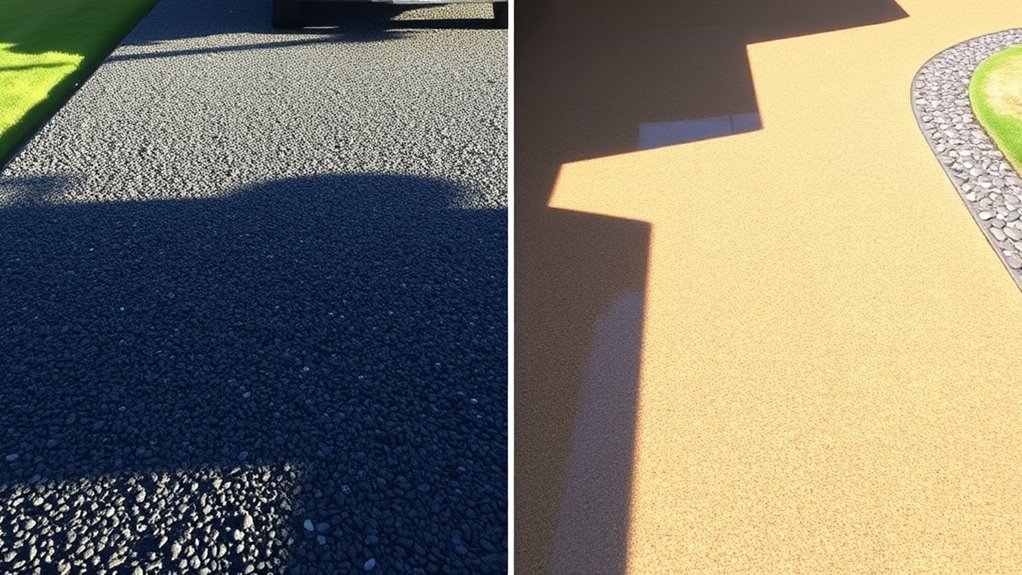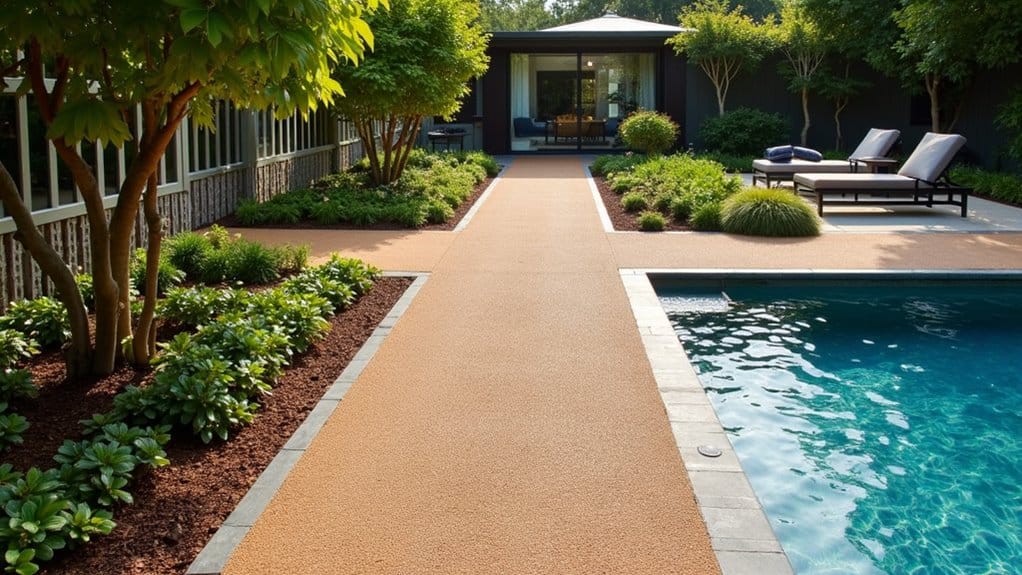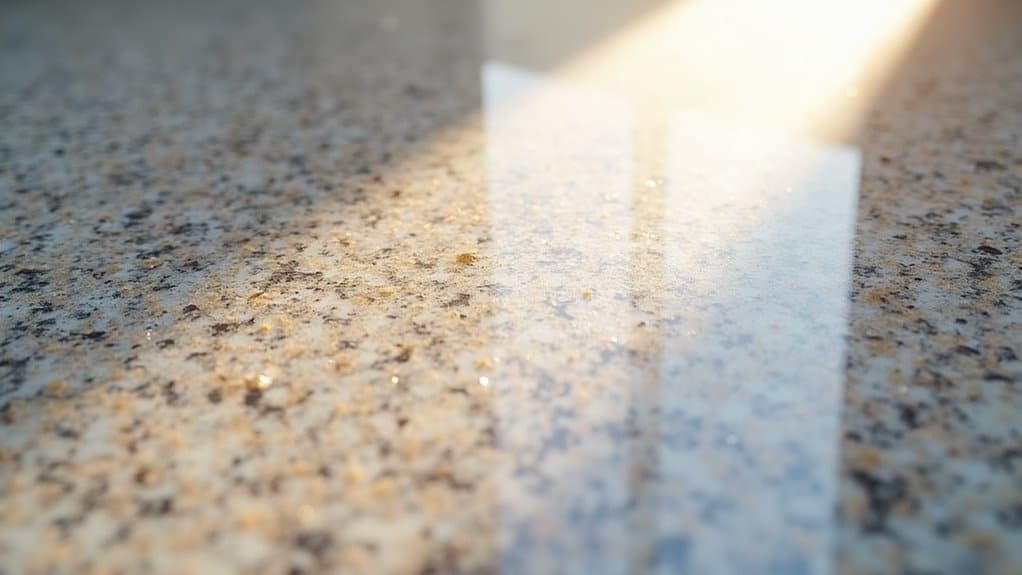When choosing between a tarmac or resin driveway, think about durability, maintenance, appearance, and environmental impact. Tarmac is budget-friendly and tough, but it can crack over time. In contrast, resin provides a sleek finish with a variety of colour options and requires less upkeep, though it typically comes with a higher price tag upfront. Consider your traffic levels, design preferences, and how much maintenance you're willing to commit to. Both options have their benefits, so it's worth exploring their differences further.
Table of Contents
ToggleKey Takeaways
- Tarmac driveways are generally cheaper upfront, while resin driveways provide an upscale finish and more design options.
- Tarmac is tough enough for heavy vehicles but can crack over time; resin, on the other hand, is more weather-resistant and lasts longer.
- Maintaining a tarmac driveway involves regular sealing and repairs, whereas resin needs very little attention—just a sweep and rinse now and then.
- Tarmac offers limited colour choices and a basic look; resin allows for bright colours and unique designs to suit your style.
- Think about the environmental impact: tarmac can be recycled but its production uses fossil fuels, while resin can incorporate eco-friendly materials and support effective drainage.
Overview of Tarmac and Resin Driveways
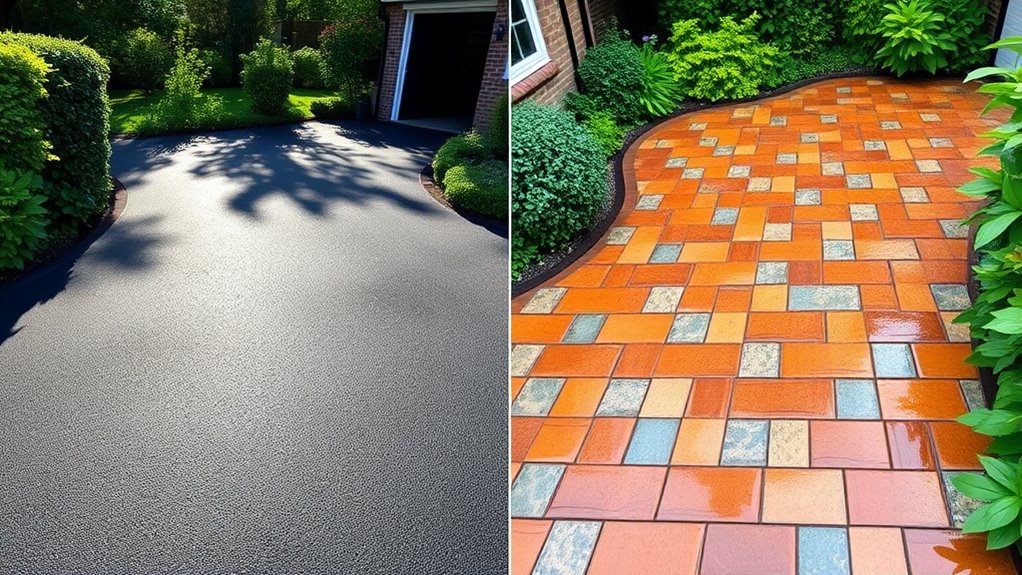
When choosing a driveway, it's important to know the differences between tarmac and resin.
Tarmac is known for its durability, making it suitable for heavy vehicles, and it's also cost-effective with low maintenance requirements. Its traditional look fits well with various home styles and can be enhanced with features like brick borders. Additionally, tarmac's highly durable nature allows it to maintain structural integrity under various conditions over time. However, tarmac is prone to cracking in extreme temperatures, which may necessitate more frequent repairs compared to resin.
In contrast, resin offers a broader range of decorative options and excellent weather resistance. While resin driveways generally last longer than tarmac, the latter can still last up to 20 years with proper care. Resin is also resistant to oil and chemicals, preventing staining, which can be an advantage over tarmac.
Both materials can boost your property's curb appeal and value, but tarmac is 100% recyclable, making it a more eco-friendly option.
Ultimately, your choice will depend on your preferences for appearance, budget, and long-term durability.
Installation Process
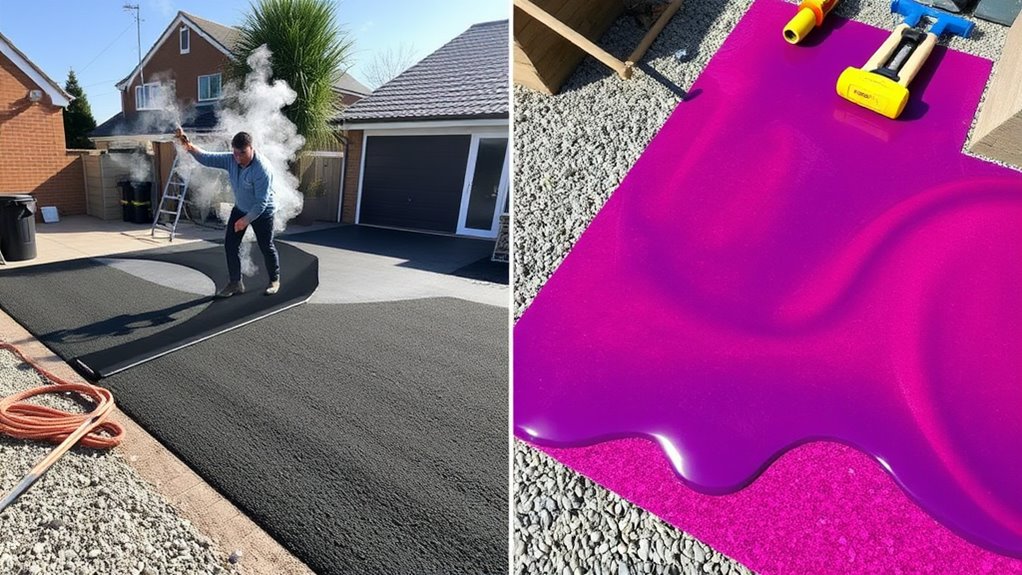
Understanding the installation process is crucial when deciding between tarmac and resin driveways.
For tarmac, the journey starts with assessing and designing the area. This includes clearing and excavating the space properly. A stable sub-base is laid down, followed by applying tarmac in two layers. Machinery is used to ensure efficient compaction. Additionally, the installation of edging helps to establish fall, levels, and support for tarmac.
However, keep in mind that weather can impact the installation timeline. Moreover, the base preparation is essential for both tarmac and resin installations to ensure stability and longevity.
On the other hand, installing a resin driveway requires thorough surface preparation, applying a primer, and mixing resin with aggregate. Although the process demands careful attention, the curing phase can be tricky, as it's sensitive to moisture and temperature.
Ultimately, your decision will depend on which installation process aligns best with your needs and preferences.
Appearance and Customization
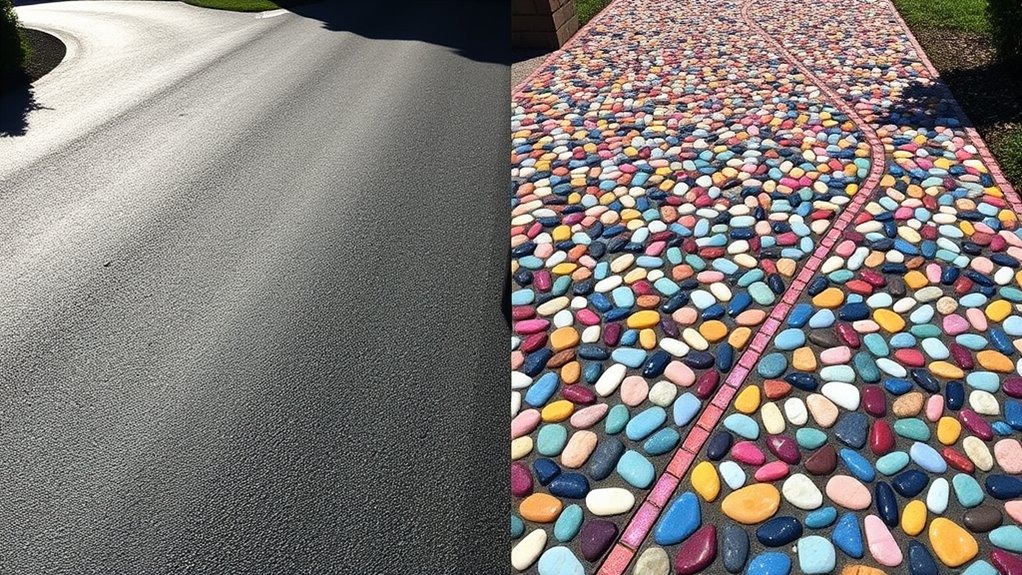
When it comes to tarmac versus resin driveways, the decision hinges on aesthetics and customization. Tarmac generally comes in limited colours like black, red, or brown, and while you can create patterns such as herringbone or geometric shapes, its overall look can be quite plain. Additionally, tarmac's durability makes it a practical choice for those needing a surface that can withstand heavy traffic and harsh weather. In contrast, resin driveways offer a wide range of colours and bespoke patterns. You can mix aggregates for different textures and add decorative borders to enhance your home's style, making them an example of aesthetic versatility. If you're looking for a high-end finish, resin truly stands out with its design flexibility compared to the more conventional appearance of tarmac.
Maintenance and Upkeep
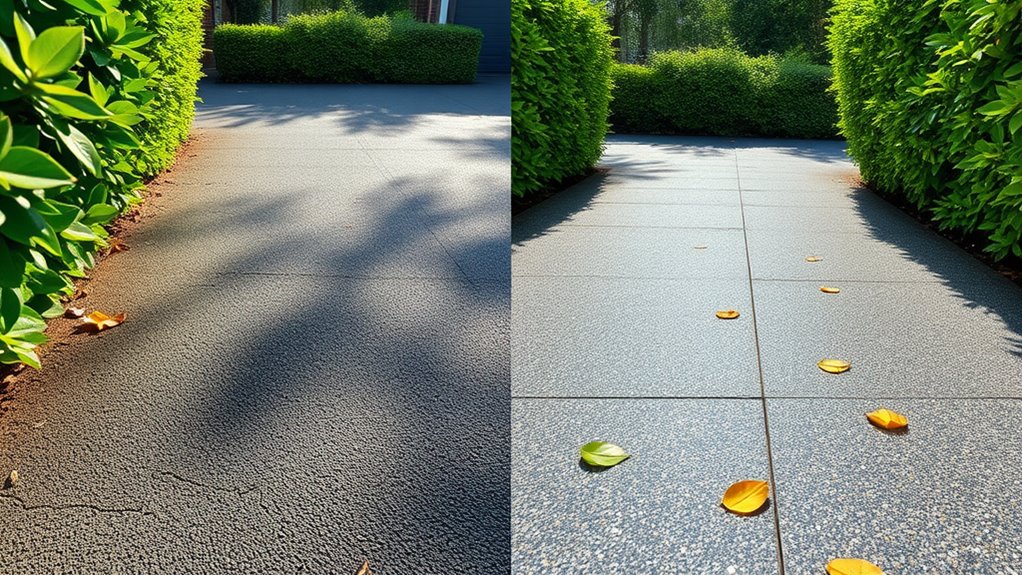
When it comes to maintaining tarmac and resin driveways, their upkeep requirements vary significantly.
Tarmac driveways need regular cleaning, such as sweeping and using a low-pressure hose to clear debris and prevent damage. It's also wise to check for cracks and potholes, as timely repairs are crucial. Generally, you'll need to reseal or resurface every few years to keep it in good condition.
In contrast, resin driveways require much less maintenance. A simple sweep and rinse are usually enough, as they resist weed growth and don't often need repairs.
Although resin repairs can be pricier, its durability and low maintenance make it a more convenient option over time.
Environmental Considerations
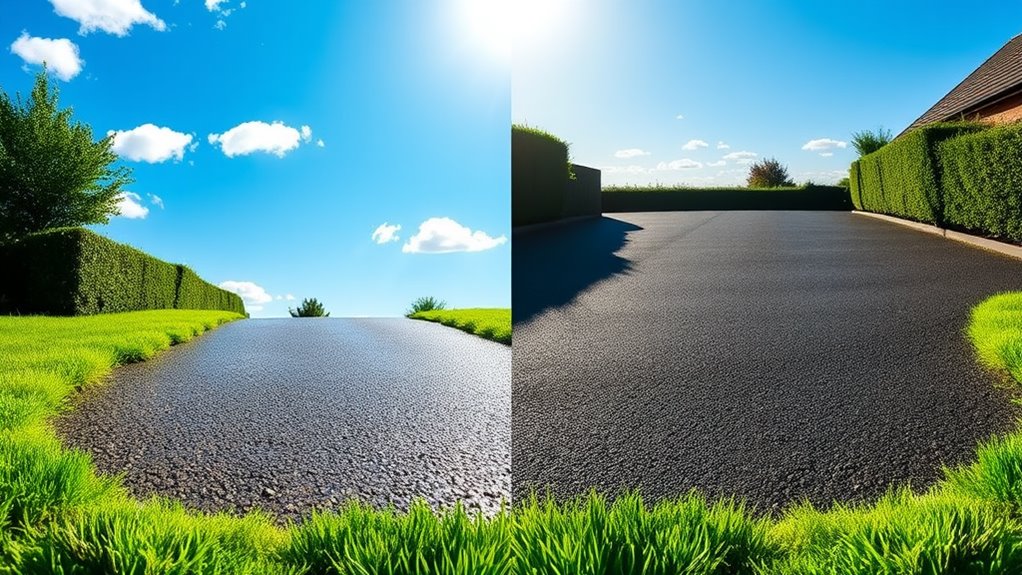
Maintaining a driveway goes beyond looks; it significantly affects the environment. Here are three important points to consider:
- Resource Use: Tarmac is made from non-renewable crude oil, whereas resin driveways often utilise sustainable materials, such as locally sourced aggregates.
- Water Management: The permeability of resin driveways reduces surface runoff, allowing water to seep back into the ground, which is beneficial for local ecosystems.
- Wildlife Impact: While tarmac can disrupt habitats, it provides a stable surface for wildlife. In contrast, the porous nature of resin helps preserve natural soil biomes.
When choosing a driveway, consider these environmental factors to align your decision with sustainability goals and minimise negative impacts on local wildlife and ecosystems.
Cost and Budget Considerations
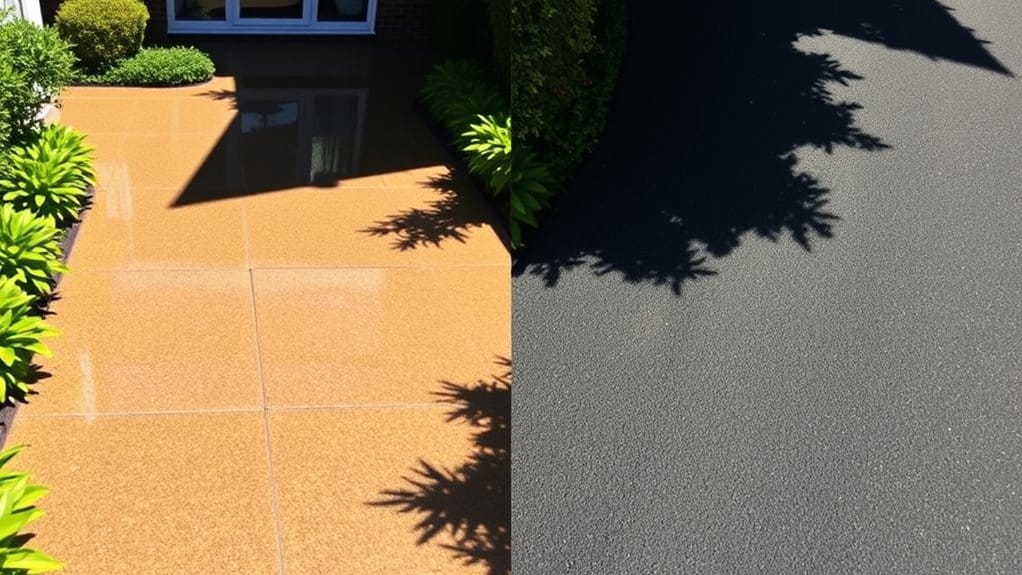
When considering a driveway, it's crucial to understand the financial impact on your long-term budget.
Tarmac driveways usually have lower initial costs, averaging around £90 per square metre, making them an economical choice. In contrast, resin driveways cost more at about £120 per square metre but tend to require less maintenance over time due to their durability.
Labour costs also differ; tarmac often needs less skilled labour, which can reduce installation expenses.
Keep in mind that prices can vary by region, with urban areas typically charging more.
Durability and Lifespan
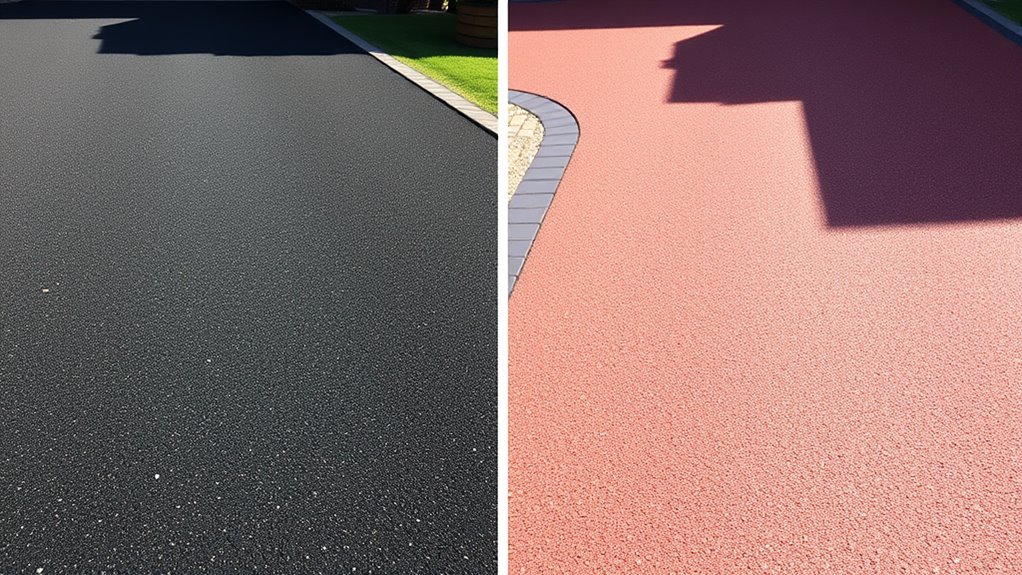
When deciding between a tarmac and a resin driveway, it's crucial to consider durability and lifespan alongside initial costs. Here are the key points:
- Lifespan: Tarmac typically lasts around 15-20 years, while resin can last even longer under the right conditions.
- Weather Resilience: Resin performs better in extreme temperatures, which helps prevent weather-related damage.
- Installation Quality: Good installation is vital for both options. A solid sub-base and proper techniques can significantly extend their life.
Tarmac is sturdy but can deteriorate quicker with heavy traffic and inadequate maintenance.
In contrast, resin's strong binding properties make it less prone to cracking and easier to maintain.
Final Thoughts on Choosing the Right Driveway
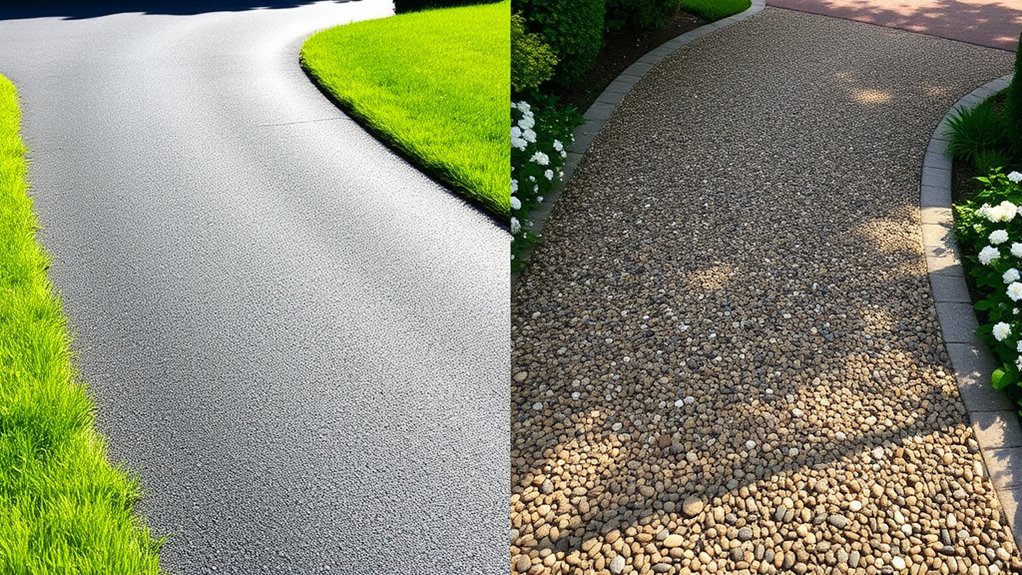
When selecting the right driveway, it's essential to weigh aesthetics, budget, and environmental impact.
For instance, resin driveways can be tailored to your taste and look attractive, while tarmac is a more budget-friendly option that can be laid quickly.
However, consider the long-term value and eco-friendliness of your choice, as these aspects can significantly affect your decision.
Aesthetic Preferences and Needs
When choosing a driveway, aesthetics are important, but it's essential to consider how each material fits with your home's style and surroundings. Here are some key points to think about:
1. Colour Psychology: Resin driveways come in a variety of colours that can enhance your home's appeal and evoke different emotions.
In contrast, tarmac offers a classic and timeless appearance.
2. Texture Contrast: You can play with textures in resin to add visual interest.
Alternatively, decorative edging on tarmac can provide a touch of style.
3. Customisation Options: Resin is highly versatile, allowing for unique designs that suit modern homes, while tarmac complements traditional styles well.
Ultimately, select a driveway that reflects your aesthetic tastes and harmonises with your property's architecture and environment.
Budget and Long-term Value
When considering a new driveway, it's important to balance initial costs with long-term value. Tarmac driveways are often cheaper upfront, making them attractive for those on a budget.
However, they require regular sealing and resurfacing, which can add up in maintenance costs over time.
In contrast, resin driveways may require a larger initial investment due to the quality of materials and installation, but they're known for their durability and minimal maintenance.
This means you'll likely save money on repairs in the future.
Ultimately, weigh the immediate costs against the long-term benefits; the overall cost-effectiveness of resin driveways typically outweighs their higher initial price.
Make a choice that will serve you well for years to come.
Environmental Impact Considerations
When selecting a driveway, it's essential to think beyond looks and price; consider the environmental impact of your choice. Here are three important factors:
- Ecological Footprint: Tarmac production relies heavily on fossil fuels, while resin driveways can incorporate eco-friendly materials, helping to lessen your ecological footprint.
- Sustainability Practices: Many resin driveways are permeable, which helps manage stormwater effectively and comply with sustainability regulations.
- Recyclability: While tarmac is recyclable, its installation can disrupt local habitats. In contrast, resin driveways cause minimal disturbance, promoting biodiversity.
In the end, your decision should reflect your commitment to sustainability, weighing durability against environmental responsibility.
Consider how each option aligns with your values and the long-term health of your local ecosystem.
Frequently Asked Questions
Can I Install a Resin Driveway Over an Existing Tarmac Surface?
Yes, you can install a resin driveway over an existing tarmac surface, as long as the tarmac is in good condition. Ensure there are no cracks, and follow the necessary preparation steps for optimal adhesion and compatibility with the resin.
How Do Weather Conditions Affect Driveway Installation?
Weather significantly affects driveway installation, so timing is crucial. Warm, dry weather ensures proper compaction, while rain or severe temperatures can weaken the surface. For instance, installing a driveway during a heatwave might be ideal, but avoid wet conditions that could lead to cracks. Choose your installation period wisely to enhance durability and minimise future maintenance.
Are There Any Color Limitations for Resin Driveways?
While resin driveways offer a wide range of colour options, there are some limitations to consider. Once sealed, changing the colour of your driveway requires starting from scratch, which can be costly and time-consuming. Therefore, it's important to choose your colour wisely, balancing aesthetics with practicality to ensure your outdoor space remains beautiful and functional for years to come. For example, opting for a neutral shade like grey or beige can provide versatility, while a bold colour may stand out but could be harder to match with future changes.
What Is the Average Lifespan of a Tarmac Driveway?
A tarmac driveway usually lasts between 15 to 20 years with proper maintenance. Regular repairs are crucial to tackle wear and tear, helping you get the most out of your driveway while keeping it smooth and durable. For example, filling in cracks and addressing any subsidence promptly can significantly extend its life.
Can I Drive on My New Driveway Immediately After Installation?
You shouldn't drive on your new driveway straight after it's been installed. It's important to allow it to cure properly; wait at least 24 hours for resin and several days for tarmac, depending on the weather. This ensures your driveway remains safe and durable. For example, if you've just had a tarmac drive laid, give it time to set before using it to avoid damage.
Conclusion
Ultimately, the choice between a tarmac and resin driveway depends on your individual needs and tastes. If you want a contemporary, polished appearance, resin is likely your best option. On the other hand, if you value durability and affordability, tarmac may be more suitable. Whichever option you select, ensure it fits well with your home and remains resilient over time, much like a dependable vehicle on a familiar route.
Prepare the perfect base for your resin bound stone installation and discover the crucial factors that ensure lasting durability.
Know where resin bound surfacing can transform spaces for both residential and commercial use, and discover the countless benefits that Read more
A stone carpet combines beauty and resilience in flooring, but what makes quartz floors uniquely beneficial? Discover the secrets behind Read more

